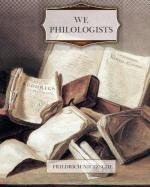These questions, however, are not asked as a rule: The sway of philology over our means of instruction remains practically unquestioned; and antiquity has the importance assigned to it. To this extent the position of the philologist is more favourable than that of any other follower of science. True, he has not at his disposal that great mass of men who stand in need of him—the doctor, for example, has far more than the philologist. But he can influence picked men, or youths, to be more accurate, at a time when all their mental faculties are beginning to blossom forth—people who can afford to devote both time and money to their higher development. In all those places where European culture has found its way, people have accepted secondary schools based upon a foundation of Latin and Greek as the first and highest means of instruction. In this way philology has found its best opportunity of transmitting itself, and commanding respect: no other science has been so well favoured. As a general rule all those who have passed through such institutions have afterwards borne testimony to the excellence of their organisation and curriculum, and such people are, of course, unconscious witnesses in favour of philology. If any who have not passed through these institutions should happen to utter a word in disparagement of this education, an unanimous and yet calm repudiation of the statement at once follows, as if classical education were a kind of witchcraft, blessing its followers, and demonstrating itself to them by this blessing. There is no attempt at polemics . “We have been through it all.” “We know it has done us good.”
Now there are so many things to which men have become so accustomed that they look upon them as quite appropriate and suitable, for habit intermixes all things with sweetness; and men as a rule judge the value of a thing in accordance with their own desires. The desire for classical antiquity as it is now felt should be tested, and, as it were, taken to pieces and analysed with a view to seeing how much of this desire is due to habit, and how much to mere love of adventure—I refer to that inward and active desire, new and strange, which gives rise to a productive conviction from day to day, the desire for a higher goal, and also the means thereto . as the result of which people advance step by step from one unfamiliar thing to another, like an Alpine climber.
What is the foundation on which the high value attached to antiquity at the present time is based, to such an extent indeed that our whole modern culture is founded on it? Where must we look for the origin of this delight in antiquity, and the preference shown for it?




